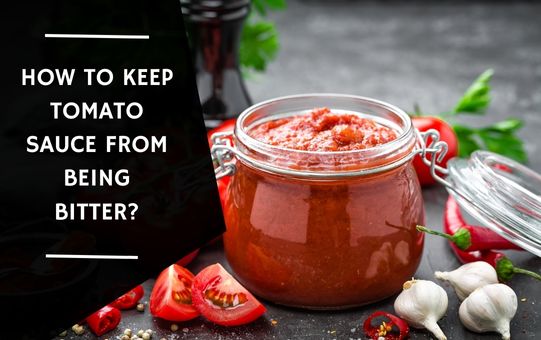Tomato sauce is a staple in numerous cuisines, and for good reason – it is tasty and versatile. However, how to keep tomato sauce from being bitter?
To prevent tomato sauce from becoming bitter, select ripe tomatoes, remove the seeds and core, add a small amount of sugar or fat to balance the acidity, and cook the sauce for an extended period of time to allow the flavors to develop.
In this article, we will discuss these steps so that you can always make perfectly balanced, flavorful tomato sauce.
Contents
Why How to keep tomato sauce from being bitter Matter?
The bitterness in tomato sauce can drastically affect its flavor and render it unappetizing. To avoid the sauce’s bitterness, one must take certain precautions during the cooking process. For instance, using ripe tomatoes with a bright red color and firm texture is crucial.
Overcooking the sauce can lead to bitterness, so it’s essential to cook the sauce only until it reaches the desired consistency. Additionally, avoiding burnt tomato sauce is critical as burnt tomato sauce can lead to bitterness and an unpleasant taste.
Balancing flavors is also crucial in preventing tomato sauce from becoming bitter. Adding too much salt or sugar can cause the sauce to become bitter. Instead, adding small amounts of salt and sugar at a time and tasting the sauce frequently can help balance the flavors and prevent bitterness.
Steps to keep tomato sauce from being bitter
Here are a few steps following them you can keep tomato sauce from being bitter
1. Choose ripe tomatoes
One of the most common causes of bitter tomato sauce is using tomatoes that are not fully ripe. Tomatoes that are still green or not fully red will often have a bitter taste, and this can carry over into the finished sauce.
To avoid this, be sure to choose tomatoes that are fully ripe, with a deep red color, and have soft, pliable skin. If you’re using canned tomatoes, look for ones that are packed in juice rather than water – they’ll often have a more natural, less bitter taste.
2. Remove the seeds and core
Tomatoes have a lot of seeds and a tough, fibrous core, both of which can contribute to a bitter taste in your sauce. To get rid of these bitter elements, it’s a good idea to remove the seeds and core from your tomatoes before you start cooking.
This is especially important if you’re using tomatoes that are not fully ripe, as the seeds and core can be even more bitter in these cases. To remove the seeds and core, cut the tomatoes in half and use a spoon to scoop out the seeds and core. You can then discard them or save them for another use (like making tomato juice).
3. Use a little sugar
Tomatoes have a naturally acidic taste, which can sometimes come across as bitter. One way to counter this is to add a little bit of sugar to your sauce. The sugar will help balance out the acidity and give the sauce a more rounded, complex flavor.
Just be sure to use a light hand – a little bit of sugar goes a long way, and you don’t want to end up with a sweet sauce. A teaspoon or two should be enough for a batch of tomato sauce.

4. Add some fat
Another way to balance out the acidity in tomato sauce is to add a little bit of fat. This could be in the form of butter, olive oil, or even a small amount of cream. The fat will help round out the flavor of the sauce and make it more balanced.
Just be sure to use a light hand – you don’t want to end up with a greasy sauce. A tablespoon or two should be enough for a batch of tomato sauce.
5. Cook the sauce for a long time
Finally, one of the best ways to prevent tomato sauce from turning bitter is to cook it for a long time. This will allow the flavors to fully develop and mellow out, resulting in a smoother, more balanced sauce.
Try simmering your tomato sauce for at least an hour, or even longer if you have the time. The longer you cook it, the more the flavors will come together and the less bitter it will be.
Read Also: How to make your tomato sauce better?
Conclusion:
With these tips in mind, you should be well on your way to making perfectly balanced, flavorful tomato sauce every time. Whether you’re making a simple marinara or a more complex tomato-based dish, these steps will help ensure that your sauce tastes good.
Faq’s| keep tomato sauce from being bitter
Following are the FAQs related to keeping tomato sauce from being bitter:
What Causes Tomato Sauce To Be Bitter?
Bitter tomato sauce is often caused by using tomatoes that are not fully ripe, as they can have a naturally bitter taste. It can also be caused by the seeds and core of the tomatoes, which can be bitter and contribute to the overall flavor of the sauce.
How Do I Choose Ripe Tomatoes For My Sauce?
To choose ripe tomatoes for your sauce, look for ones that are deep red in color and have soft, pliable skin. Avoid tomatoes that are still green or not fully red, as they will likely have a bitter taste.
How Do I Remove The Seeds And Core From My Tomatoes?
To remove the seeds and core from your tomatoes, cut them in half and use a spoon to scoop out the seeds and core. You can then discard them or save them for another use.
How Much Sugar Or Fat Should I Add To My Tomato Sauce?
When adding sugar or fat to your tomato sauce, use a light hand. A teaspoon or two of sugar, or a tablespoon or two of fat, should be enough for a batch of tomato sauce. Be sure to taste as you go to find the right balance of flavors.
How Long Should I Cook My Tomato Sauce?
To prevent your tomato sauce from turning bitter, it’s a good idea to cook it for a long time. Try simmering your sauce for at least an hour, or even longer if you have the time. The longer you cook it, the more the flavors will come together and the less bitter it will be.

